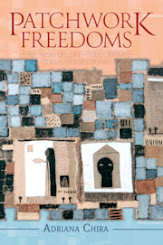Adriana Chira, Emory University, has published Patchwork Freedoms: Law, Slavery, and Race beyond Cuba's Plantations (Cambridge University Press)
In nineteenth-century Santiago de Cuba, the island of Cuba's radical cradle, Afro-descendant peasants forged freedom and devised their own formative path to emancipation. Drawing on understudied archives, this pathbreaking work unearths a new history of Black rural geography and popular legalism, and offers a new framework for thinking about nineteenth-century Black freedom. Santiago de Cuba's Afro-descendant peasantries did not rely on liberal-abolitionist ideologies as a primary reference point in their struggle for rights. Instead, they negotiated their freedom and land piecemeal, through colonial legal frameworks that allowed for local custom and manumission. While gradually wearing down the institution of slavery through litigation and self-purchase, they reimagined colonial racial systems before Cuba's intellectuals had their say. Long before residents of Cuba protested for national independence and island-wide emancipation in 1868, it was Santiago's Afro-descendant peasants who, gradually and invisibly, laid the groundwork for emancipation.
Here are some endorsements:
'In this meticulously researched and beautifully written book, Chira shows that freedom for African descended peasants in places like Santiago, Cuba was not an abstraction, but rather a protracted process of claims-making negotiated with local legal institutions. Bringing together legal, political, social and economic history, Patchwork Freedoms will prove indispensable to all who want to understand the key role of manumission in slavery and emancipation.'
Ariela J. Gross - co-author of Becoming Free, Becoming Black: Race, Freedom and Law in Cuba, Virginia and Louisiana
'This fascinating study sets out to change our understanding of bondage and emancipation. It places land ownership at the center of racial dynamics, demonstrates the need to study the local to understand the global, and contributes greatly to our comprehension of why Eastern Cuba became so essential to both Cuban independence and the Cuban revolution.'
Tamar Herzog - Monroe Gutman Professor of Latin American Affairs, Harvard University
'Patchwork Freedoms examines the ways in which Santiago’s quasi-freed population negotiated the terms of their emancipation and autonomy by shaping locally grounded notions of custom. Chira shows how Santiago’s black population articulated a legal vernacular of freedom, self-purchase, and social mobility in the absence of laws on the books, rendering custom a malleable and resilient category. This is a superbly researched book that will define the field of quasi emancipation and the customary laws of slavery for decades to come.'
Michelle A. McKinley - University of Oregon School of Law
'This is a powerful history of claims-making and political identity formation among enslaved and free people of African descent in a key region of the Atlantic world. Digging into the soil of eastern Cuba, Chira deftly upturns superficial narratives about the emancipatory nature of liberalism in the nineteenth century. In this book, legal and political freedoms do not just happen: they are won, piecemeal, by people with deep and complex attachments to the land they worked, the island and empire they inhabited, and to one another.'
Bianca Premo - author of The Enlightenment on Trial: Ordinary Litigants and Colonialism in the Spanish Empire
--Dan Ernst

